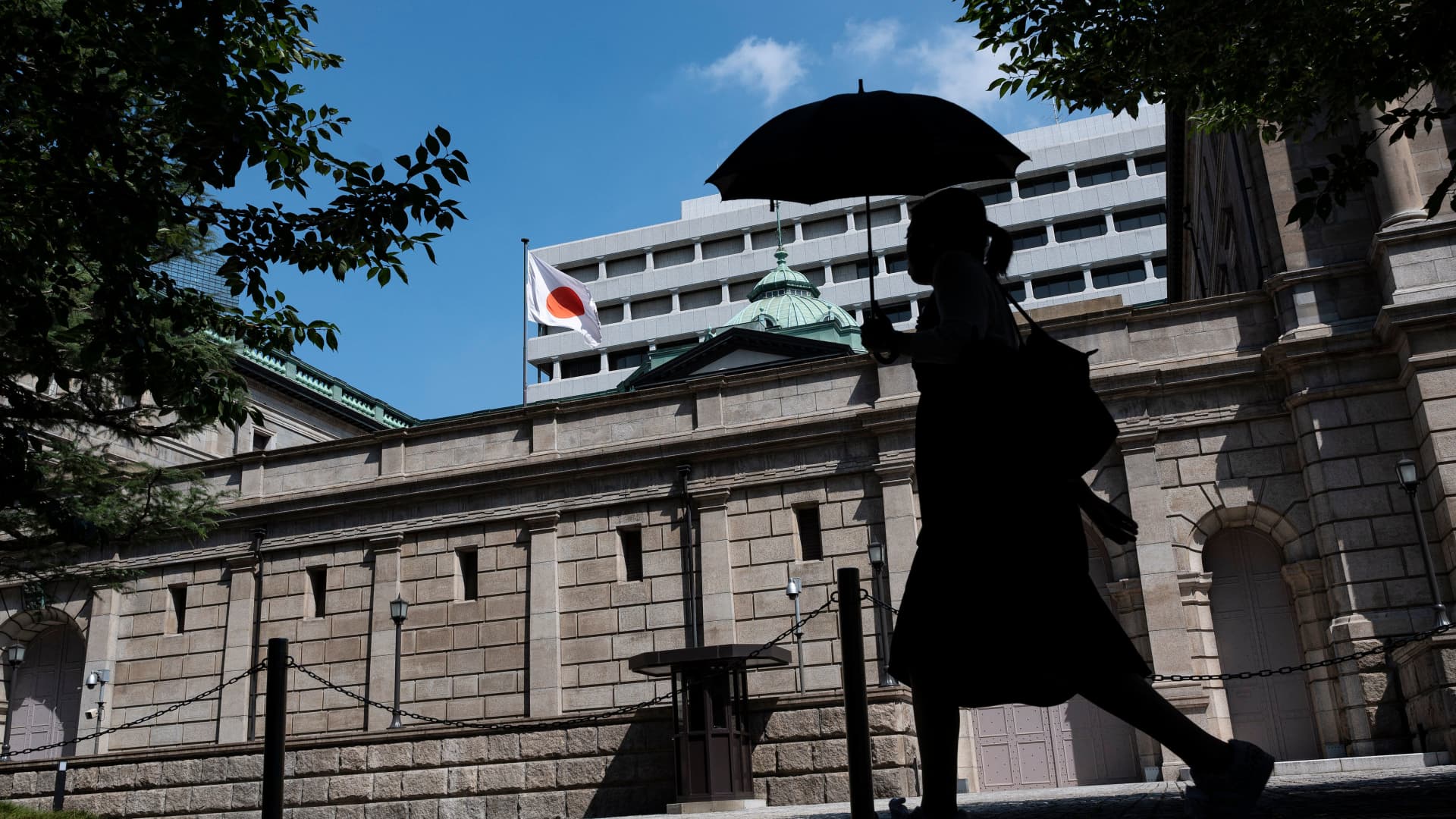A man passes by an electronic board showing the stock indexes in Tokyo, Japan, Oct. 15, 2020. (Photo by Du Xiaoyi/Xinhua via Getty) (Xinhua/Du Xiaoyi via Getty Images)
Du Xiaoyi | Xinhua News Agency | Xinhua News Agency | Getty Images
Asia-Pacific markets opened higher after most major indexes closed lower in the previous session. Investors are watching for more economic data to help give stock markets more direction.
The tepid gains arrive after South Korean stocks retreated more than 2% from their Monday rally, while U.S. markets closed out their longest winning streaks in nearly two years.
The Reuters Tankan poll showed Japanese manufacturers' business confidence improved for the first time since August and service-sector mood rose for a second month, underscoring a challenging outlook amid a patchy economic recovery.
Japan's Nikkei 225 gained 0.57%, while the Topix added 0.14%.
In South Korea, the Kospi added 0.72% and the Kosdaq inched 0.30% higher at open.
Australia's S&P/ASX 200 added 0.31%..
Futures for Hong Kong's Hang Seng index stood at 17,727, pointing to a marginally higher open compared to the HSI's close of 17,670.16.
Wall Street's main indexes closed higher on Tuesday, with the S&P 500 and Nasdaq Composite clocking their longest winning streaks in nearly two years.
The S&P 500 closed 0.28% higher, while the Nasdaq jumped 0.9%. The Dow Jones Industrial Average edged up 0.17% at close.
The S&P 500 rose for a seventh consecutive day for the first time since its eight-day win streak in November 2021. The Nasdaq posted eight days of wins for the first time since an 11-day streak ended in November 2021. The Dow rose for a seventh straight session for its longest streak since July.
— CNBC's Samantha Subin and Brian Evans contributed to this report
Soft landing could fuel 15% rally in global equities, HSBC says
Global equities look situated for a significant rally in the new year should central banks begin easing monetary policy and the Federal Reserve manage a soft landing, according to HSBC.
"We expect global equity markets to climb higher and forecast 15% upside by end-2024," said Alastair Pinder in a note to clients. "But, against a backdrop of slowing economic growth and declining interest rates, we think market breadth will increasingly narrow, with a large proportion of the market treading water, while US supremacy will likely continue."
In recent instances where the Fed has engineered a soft landing, the S&P 500 has rallied 22% on average between the pause in hikes, and six months after the bank's begun cutting, he noted.
Given this setup, Pinder favors technology and consumer discretionary sectors, believing that risks look better priced following the recent pullback in equities.
— Samantha Subin
Fed’s Goolsbee says 'golden path' is still possible
Chicago Federal Reserve President Austan Goolsbee said Tuesday a soft landing is still on the table as the central bank seeks to combat inflation without hurting the economy significantly.
"Because of some of the strangeness of this moment, there is the possibility of the golden path ... that we got inflation down without a recession," Goolsbee said on CNBC's "Squawk Box."
Goolsbee said the drop in price pressures might equal the fastest decline in inflation in the last century.
— Yun Li
U.S. crude falls below $78 a barrel to lowest level since July
U.S. crude prices have fallen nearly 4% to their lowest level since July, as weak economic data overshadows concerns that the Israel-Hamas war could erupt into a broader regional conflict.
West Texas Intermediate was down $3.09, or 3.82%, at $77.73 a barrel, while Brent fell $3.19, or 3.75%, to $81.99 a barrel, both at their lowest prices since July.
The drop came after China's exports fell more than expected in October, indicating softening global demand.
-- Spencer Kimball
Market rally may be fleeting, Wolfe Research says
Wolfe Research strategist Rob Ginsberg noted that the early November rally could soon stall out, if the trading action from earlier in the year is any indication.
"Each rally since the July peak has stalled out before making a fresh 1-month high, before rolling over to a new 1-month low…the definition of a downtrend," Ginsberg said.
To be sure, he also noted that some momentum indicators "inflected positive for all of the indices (last week), and today we see it being confirmed at the stock level."
— Fred Imbert

 1 year ago
274
1 year ago
274




























 English (US)
English (US)